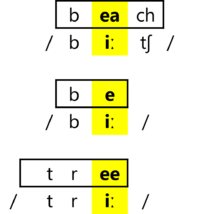
English pronunciation is a problem for many English learners. But why? One of the key difficulties is English spelling. In a number of other languages, words are spelled as they are pronounced and vice versa. This is not always the case in English and the correct English pronunciation or spelling often does not appear to be logical. Native speakers are lucky! We learn new English words and their pronunciation and spelling as we grow up, but for English language learners it can be a nightmare.
Let’s start with individual sounds
[Last updated on 25/07/2018]
We know that the English alphabet has 26 letters (from A-Z), and that it is made up of 5 vowels (A, E, I, O, U) and 21 consonants (e.g. B, C, D etc.). However, English pronunciation is not as simple, because there are 44 different sounds (British English) in total.

You can see from the diagram that the greatest difference lies with English vowels. This gives an idea as to why English pronunciation is so complicated for language students (and English teachers too), but for now, think of a nice beach!

When you look in a dictionary, you can find each word, the part of speech, the meaning and often an example sentence. Here is our example of a dictionary entry for the word beach.
- beach
- noun
- /biːtʃ/
- An area of sand or small stones next to the sea or a lake
- I go the beach when I am on holiday.
What is /biːtʃ/?
This is the same word (beach), but spelled with the phonetic alphabet. The phonetic alphabet uses special symbols for each pronunciation sound, so that we can write how the word is pronounced.
Can you identify the English vowel sound?
The vowel sound in ‘beach’ is spelled ‘ea’ and the phonetic symbol is ‘iː’. This is just one sound.
In English, one sound can often be spelled in different ways. So, it is useful to know the different phonetic sounds to improve English pronunciation. For example, look at the diagrams for ‘be’ and ‘tree’. The vowel sound is the same as ‘beach’, but the spelling is different.

How can I improve my English pronunciation?
We recommend learning the phonetic symbols to benefit your English fluency and pronunciation. This can help you to understand the differences in spelling and improve your listening and speaking. We invite you to follow us for updates and to improve your English skills too.
You can also register for our private English courses with qualified English teachers in Munich who can help you to improve your English pronunciation and fluency.